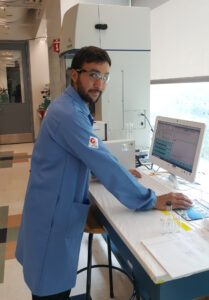Nanotechnology at Northwestern
Meet Karam Idrees, a graduate student in the Farha Research Group
January 04, 2022
Karam Idrees is a graduate student in the Farha Research Group, which seeks to solve problems in chemistry and materials science ranging from energy and environment related applications to challenges in national defense by employing atomically precise functional materials such as metal–organic frameworks (MOFs) and porous organic polymers (POPs).

Where are you originally from?
I am from Iraq.
Where did you complete your undergraduate degree?
I completed my undergraduate degree in chemistry at Millersville University.
When did you first become interested in chemistry?
I first became interested in chemistry during high school but was further captivated following my freshman year in college, after I joined Dr. Edward Rajaseelan’s research lab. The research experience showed me how chemistry can be applied to solve many of our world’s problems, in addition to answering many fundamental questions.
How do you explain what you study to non-scientists?
I work with crystalline, porous materials called metal-organic frameworks (MOFs) which can be used for many applications such as gas storage and separation. These materials function similar to sponges or sieves on the molecular level to capture or separate small molecules with ultra-high capacity or selectivity depending on the application.
What are the challenges you’re trying to solve with metal-organic frameworks? What kind of potential do you see for them?
The modularity and highly ordered nature of MOFs allow them to be finely tuned towards a specific application. My work is geared towards designing materials capable of capturing and purifying important feedstock chemicals via an energy-friendly pathway.
What has been a highlight of your time at Northwestern?
There have been many rewarding experiences throughout my time at Northwestern. Research is an iterative process with successes and failures along the way. Not all ideas will be fruitful but a constant flow of them, along with perseverance, will eventually pay out.
Recently, I was able to apply my knowledge and experience to design and synthesize materials that are capable of separating molecules at an angstrom-level of precision.
What has been the most challenging aspect of your work or your time at Northwestern?
The most challenging aspect was attempting to complete my experiments during the pandemic. Shutdowns and restrictions made it challenging to complete tasks on time. However, this taught me how to incorporate remote access to be more efficient with my time.
Can you tell me about your experiences either being mentored or mentoring others?
The diverse expertise in the Farha Group has led to many fruitful collaborations. Being knowledgeable in a specific area has allowed me to share that expertise with others in the lab. At the same time, being unfamiliar with another area was equally met with eager mentors to guide me along the way.
What are your hobbies outside of the lab?
In my free time, I enjoy traveling, hiking, and visiting nature sites. I also enjoy cooking while at home.